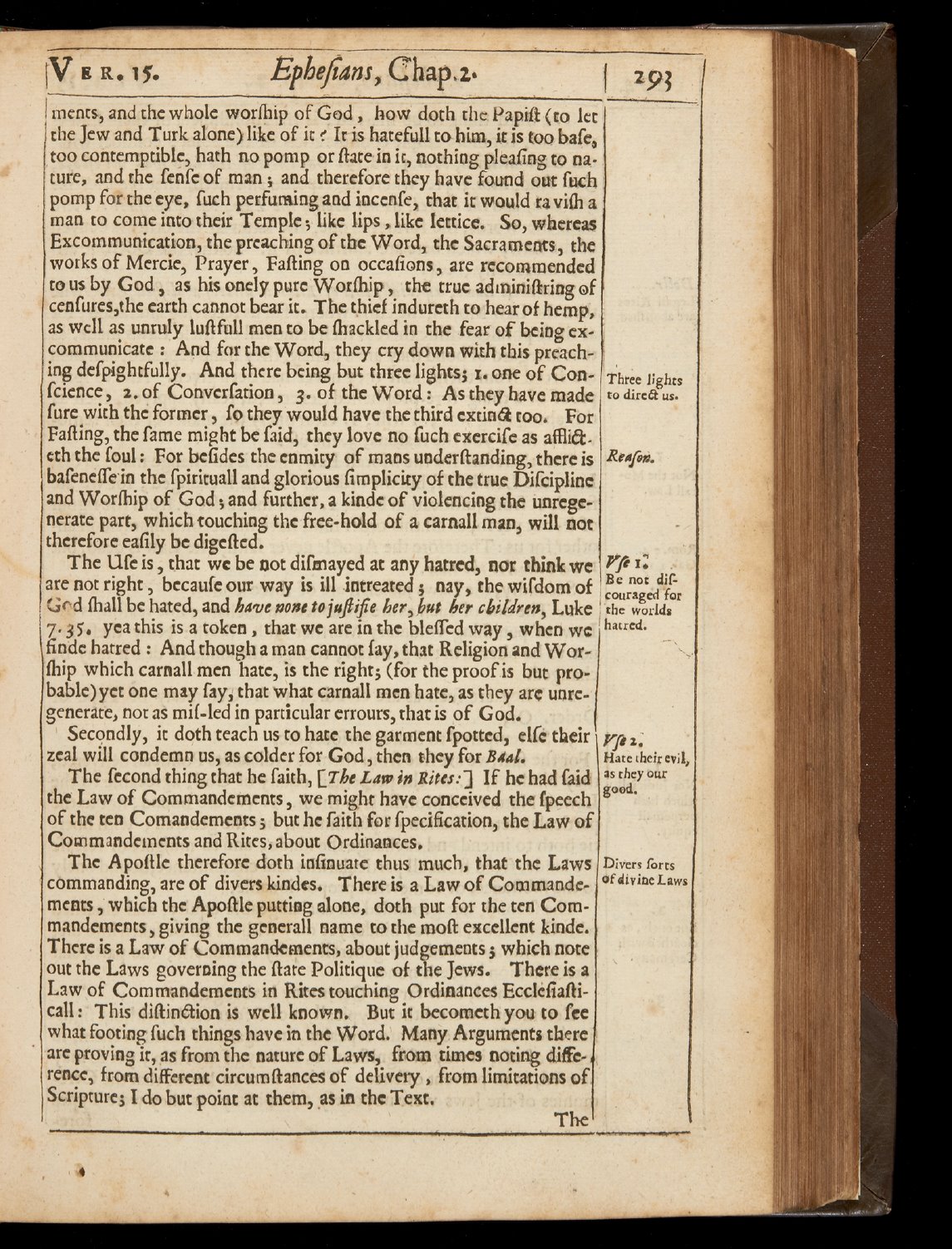

IV
E
R.
1
f.
Ephefianl,
C'hap.2
293
ments,
and
the whole worthip
of
God
,
how doth the
Papift
(to
let
the Jew
and
Turk alone)
like
of
it
5.
Ir
is
hateful!
to
him, it
is
too bafe,
too contemptible, hath no pomp or
flare in
ic,
nothing
pleating
to
na-
ture,
and the fente
of
man
;
and
therefore they have found
out
filch
pomp
for
the eye,
fuch
perfuming
and incenfe,
that it
would
ra
vial a
man
to come
into their
Temple;
like
lips
,
like
lettice. So, whereas
Excommunication, the preaching
of
the
Word,
the Sacraments, the
works
of
Mercie,
Prayer,
Fatting
on
occafions,
are
recommended
to
us
by God
as his
oncly
pure
Worthip,
the
true adminiftring of
cenfilres,the earth cannot bear it.
The
thief
indureth to
hear of
hemp,
as
well
as
unruly
tuftfull
men
to be
(hackled
in
the
fear
of
being ex-
communicate
:
And for the
Word,
they
cry
down with this
preach-
ing
defpightfully. And there being but three
lights; r.
one
of
Con
-
fcicnce,
2.
of
Converfation
,
3.
of the Word
:
As they have made
fore
with the
former,
fo they
would have the third
extinu
too. For
Fatting, the
fame
might
be
Paid,
they love no inch exercife
as
afHi
&-
eth
the
foul
:
For
befides the enmity
of
mans
underftanding, there
is
bafeneffe
in
the
fpirituall and
glorious fimplicity of the
true Difcipline
and
Worthip
of
God
;
and
further,
a
kinde
of
violencing
the unrege-
nerate
part, which touching the
free
-hold
of
a
carnall man, will
not
therefore
eafily
be digefted.
The
Ufe
is,
that
we be
not difmayed
at
any hatred, nor think we
are not
right,
bccaufe our way
is
ill
intreated
;
nay, the wifdom of
Gc
d
fhall
be hated,
and have
none to
jullifie
her,
but her
children, Luke
7.35.
yea this
is
a
token
,
that
we are in
the
bleffed
way,
when we
finde hatred
:
And though
a
man cannot fay,
that
Religion
and
Wor-
(hip
which carnali
men
hate,
is
the
right;
(for the
proof
is
but pro
-
bable)yet
one may fay, that what carnali
men
hate,
as
they
are unre-
generate,
not
as
mit
-led
in
particular errours,
that
is
of
God.
Secondly,
it
doth teach
us
to hate the garment fpotted,
elfe
their
zeal
will
condemn
us,
as
colder for
God,
then they for Bsal.
The
fecond
thing that
he faith,
[The
Law in Riter:
] If
he had
Paid
the Law
of
Commandements,
we might have conceived
the
fpeech
of
the ten
Comandements;
but
he faith
for
fpecification,
the Law
of
Commandements
and
Rites, about Ordinances.
The Apoftle
therefore
doth
infirm=
thus much,
that
the Laws
commanding,
are
of
divers kindes.
There
is a
Law
of
Commande-
ments ,
which the Apoftle putting alone,
doth
put
for the
ten
Com-
mandements,
giving
the
generali name
to the
molt excellent
kinde.
There
is a
Law
of
Commandements, about judgements; which note
out
the Laws governing the
flare
Politique of the Jews.
There
is a
Law
of Commandements
in
Rites touching Ordinances Ecclefiatli-
call: This
diftinEtion
is
well known. But it
becometh you to
fee
what footing inch things have
in
the
Word.
Many Arguments
there
are
proving it,
as
from
the
nature
of
Laws, from times noting
diffe-
rence, from different circumffances
of
delivery
,
from limitations
of
Scripture;
I
do
but point
at
them,
as
in
the Text.
The
Three
lights
to
dirt&
us.
Ra
fn.
Yfel.
B
not
dif-
couraged for
the worlds
hatred.
Vfe
z.
Hate
their
toi I,
as
they
our
good.
Divers
forts
or
divine Laws

















